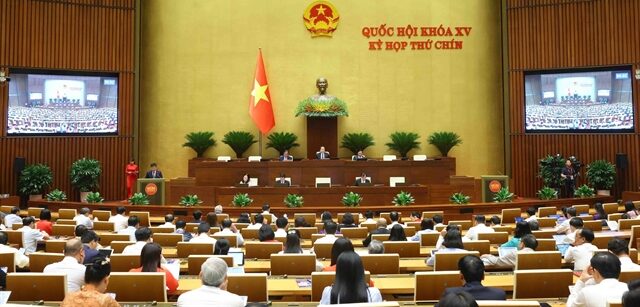HÀ NỘI ( WNAM MONITORING ): The National Assembly (NA) on Monday afternoon listened to the presentation and review report of the draft amended Law on Atomic Energy, as the 15th tenure parliament continued its ninth session.
Presenting the report on behalf of the Government, Deputy Prime Minister Lê Thành Long stated that the draft amended Law on Atomic Energy aimed to institutionalise the Party’s guidelines and policies, the State’s policies on atomic energy, unifying with other relevant documents and meeting practical requirements.
It will build a legal basis to ensure completeness and comprehensiveness in the system of legal documents on atomic energy, enhance the effective management of radiation and nuclear safety, along with enhancing security.
The unified policy, sustainably develops atomic energy applications, implements Việt Nam’s international commitments and obligations, enhances international cooperation and creates new momentum for the country’s rapid and sustainable growth in the new era.
The law is applied to domestic organisations and individuals, Vietnamese people residing abroad, foreign organisations and individuals, and international organisations conducting activities in the field of atomic energy in Việt Nam.
Accordingly, the draft amended Law on Atomic Energy has closely followed the four policies agreed upon by the Government in the Resolution 240/NQ-CP issued on December 17 last year.
The draft law consists of 12 chapters and 73 articles.
Proposal
Presenting a review on the draft law, Chairman of the NA’s Committee on Science, Technology and Environment Lê Quang Huy expressed his agreement with the name of the amended Law on Atomic Energy.
He agreed in essence with the scope of regulation and proposed study and supplements to the scope of regulation on nuclear inspection.
Regarding the nuclear regulatory agency (Article 7), the committee proposed to clearly define the nuclear regulatory agency and its working relationship. The agency must have sufficient authority, technical and management capacity, operate in compliance with the International Atomic Energy Agency (IAEA) nuclear safety standards and security guidelines and relevant international treaties.
Regarding the development and application of atomic energy (Chapter 2, from Article 10 to Article 13), the committee agreed with the necessity and content of promoting the atomic energy applications and development.
It suggested to carefully consider the ability to ensure safety for individuals and organisations when investing in and establishing facilities to conduct radiation work and to produce radioactive substances.
Regarding the safety and security of nuclear facilities (Chapter 4, from Article 28 to Article 43), the committee found that it was necessary to supplement regulations on design approval for nuclear power plants and research nuclear reactors in Article 30.
Specifically, the design of nuclear power plants and research nuclear reactors must be assessed and approved by the Nuclear Regulatory Authority of the partner country, taking into account the specific requirements of Việt Nam.
In the case of nuclear power plants and research nuclear reactors designed by Vietnamese specialised agencies, it is necessary to supplement regulations on compliance with the requirements on nuclear safety and security of the IAEA.
About the authority to decide and approve investment policies for nuclear power projects, the majority of opinions agree with the plan as submitted by the Government, stipulating that the PM will decide on investment policies for nuclear power plant construction projects.
NA deputies believed that it was necessary to carefully review the legal system to ensure consistency, feasibility as well as meet the requirements of ensuring security and safety of radiation and nuclear power.
As for radioactive waste, spent radioactive sources and spent nuclear fuel (Chapter 6, Articles 46 to 50), the committee proposed studying and supplementary policies related to the control of radioactive waste, radioactive sources in scrap and other sources imported, temporarily imported.
As for response to radiation and nuclear incidents (Chapter 9, Articles 59 to 61), the committee suggested to continue reviewing the contents of radiation and nuclear incident response plans at the grassroots, provincial and national levels to keep consistency with the Law on Civil Defence and the draft Law on State of Emergency, and the feasibility of coordination between concerned agencies.


